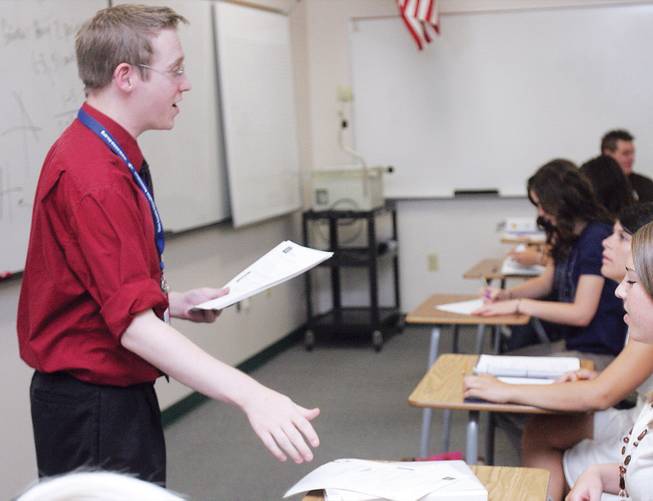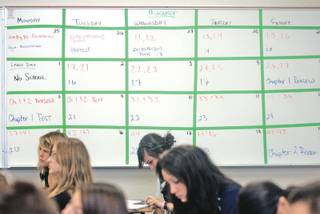
Josh Adams passes out worksheets to his Algebra 2 class for homework on Sept. 10. With only a class set of books, Adams cannot assign homework from the book.
Thursday, Sept. 18, 2008 | midnight
Learning to teach
The Home News is following Josh Adams during his first year as a full-time teacher. This is the second story in an occasional series.
When you enter Green Valley High School teacher Josh Adams' classroom, it seems too quiet. Once the first-year teacher takes his place in front of the class, students stop talking — even whispering — and listen.
"It's weird, actually," said Cleo Mayne, 16, who is in Adams' third period algebra 2 class. "Everyone pays attention, but I don't know why. … Maybe he just got lucky."
Adams said his secret is establishing a routine early and sticking to it.
If a student has been absent, there is a drill for missed homework. "Make sure it says 'absent' and stick it in the box," Adams told a student when asked where to put her makeup work.
Know you're going to miss a day? Look at the white board to find out what you'll miss. Already missed a day? Check the folder to see what you need. Time to check the previous night's homework? Pass it to the person behind you.
These routines are crucial, Principal Jeff Horn said. By providing regular systems to follow, teachers are better able to teach their students and less likely to deal with chaos.
A quiet demeanor and laid-back attitude are part of his style as Adams learns to manage five periods of computer science, applied algebra 1 and algebra 2 students. The Home News is following Adams through his first year at Green Valley High to explore the challenges new teachers in Clark County face.
Classroom management amounts to an ounce of prevention, so teachers don't have to discipline students, Adams said.
"If they know what to do and when to do it, they don't have time to get out of line," he said. "Then you don't have to yell at them or do whatever it is bad teachers do."
Adams said so far he has not had to discipline any students, and he is thankful for that. He allows students to work on homework when there is extra time at the end of the period, and the worst he has had to deal with is idle chatter and keeping students on task, he said.
Mayne said she has been able to tell that Adams is in his first year of teaching only because he has changed some of his daily routines.
"Last year I had a new teacher and it was pretty obvious," she said. "(Adams is) not doing too bad at all."
In the first couple of weeks of school, teachers have to establish their plan, Jim LaBuda, assistant professor at Nevada State College's school of education, said. They need to have it figured out before they get into class, not as an after-thought, and even then, they will find the plan is constantly changing, he said.
Adams said he has already found ways to streamline his plan.
In the first two weeks of class, "I was spending four to five hours grading every night and that was ruining my life," he said with a laugh.
In addition, he noticed the warm-ups he was doing at the beginning of each period weren't holding the attention of the class.
Now he has students grade each others' homework at the beginning of class while he reviews some of the problems. He also allows students to redo any problems they missed. This gives students the chance to learn from their mistakes, he said.
"If you're willing to put forth the effort to do it right, you deserve the score," he said.
Adams said he still goes over the homework at night, to keep students honest, but it takes much less time with his new system. Going over the problems during class also provides time to ask questions about the homework, which the students didn't have before, he said.
"He actually listened to us," said Andrea Broadaway, 17, who is in his third period algebra 2 class, noting that going over the homework in class was something the students requested.
Some of the theories are difficult to understand, she said, so even students who did their homework every night were having trouble.
"We all have questions," she said. "He's really helpful and answers them all."
At the beginning of his periods, Adams allows talking while homework is being checked, but he said, "When I'm ready to teach, mouths need to be shut."
He had instilled this idea by the third week. After the class had wrapped up with the homework, chattering continued until Adams said, "Let's quiet down and get started."
Immediately, the room got quiet, and Adams launched into the next theory.
Frances Vanderploeg can be reached at 990-2660 or [email protected].


Join the Discussion:
Check this out for a full explanation of our conversion to the LiveFyre commenting system and instructions on how to sign up for an account.
Full comments policy